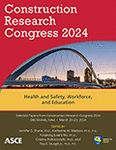Individual Component Detection of a Scaffolding Assembly for Vision-Based Safety Check
Publication: Construction Research Congress 2024
ABSTRACT
Fall from heights accounts for 50% of the accidents on construction sites, and 20% are scaffolding-related. Therefore, ensuring the safety of scaffolding installation can significantly reduce accidents onsite. Scaffoldings are erected by assembling components such as footboards, standards, ledgers, and cross-bracings. A safety check must ensure all necessary components in a scaffolding unit are installed in the correct order. While vision-based scaffolding detection has become more accurate with the recent success of deep learning detection algorithms, the detection of individual scaffolding units and their components is still challenging due to the scaffolding component size and shape. The size and shape factors pose many difficulties for the vision algorithms to detect thin structures and components of similar looks. To address the difficulties, this study proposes a method to segment the scaffolding units and components from a point cloud using a deep learning-based 3D semantic segmentation model. After segmentation, a rule-based approach can be applied to check the missing components. The method has been implemented in a construction project, and the preliminary results confirm its applicability for drawing workers’ attention to the missing scaffolding components, thereby improving the construction site’s safety.
Get full access to this article
View all available purchase options and get full access to this chapter.
REFERENCES
Fang, W., Zhong, B., Zhao, N., Love, P. E. D., Luo, H., Xue, J., and Xu, S. (2019). “A deep learning-based approach for mitigating falls from height with computer vision: Convolutional neural network.” Advanced Engineering Informatics, Elsevier, 39(October 2018), pp.170–177. https://doi.org/10.1016/j.aei.2018.12.005.
Khan, M., Khalid, R., Anjum, S., Tran, S. V.-T., and Park, C. (2022). “Fall Prevention from Scaffolding Using Computer Vision and IoT-Based Monitoring.” Journal of Construction Engineering and Management, 148(7), pp.1–15. https://doi.org/10.1061/(asce)co.1943-7862.0002278.
Kim, J., Chung, D., Kim, Y., and Kim, H. (2022a). “Deep learning-based 3D reconstruction of scaffolds using a robot dog.” Automation in Construction, Elsevier B.V., 134(September 2021), pp.104092. https://doi.org/10.1016/j.autcon.2021.104092.
Kim, J., Kim, J., Koo, N., and Kim, H. (2022b). “Automated Checking of Scaffold Safety Regulations using Multi-Class 3D Segmentation.” Proceedings of the International Symposium on Automation and Robotics in Construction, 2022-July(Isarc), pp.115–119. https://doi.org/10.22260/isarc2022/0018.
Kolar, Z., Chen, H., and Luo, X. (2018). “Transfer learning and deep convolutional neural networks for safety guardrail detection in 2D images.” Automation in Construction, Elsevier, 89(January), pp.58–70. https://doi.org/10.1016/j.autcon.2018.01.003.
Lin, P., Lin, J. J., and Hsieh, S. (2023). “Construction Site Scaffolding Completeness Detection Based on Mask R- CNN and Hough Transform.” 30th EG-ICE: International Conference on Intelligent Computing in Engineering, London, UK, pp.1–10.
Pal, A., and Hsieh, S. H. (2021). “Deep-learning-based visual data analytics for smart construction management.” Automation in Construction, Elsevier B.V., 131(August), pp.103892. https://doi.org/10.1016/j.autcon.2021.103892.
Wang, Q. (2019). “Automatic checks from 3D point cloud data for safety regulation compliance for scaffold work platforms.” Automation in Construction, Elsevier, 104(March), pp.38–51. https://doi.org/10.1016/j.autcon.2019.04.008.
Whitaker, S. M., Graves, R. J., James, M., and McCann, P. (2003). “Safety with access scaffolds: Development of a prototype decision aid based on accident analysis.” Journal of Safety Research, 34(3), pp.249–261. https://doi.org/10.1016/S0022-4375(03)00025-2.
Information & Authors
Information
Published In
History
Published online: Mar 18, 2024
ASCE Technical Topics:
- Algorithms
- Business management
- Construction engineering
- Construction equipment
- Construction management
- Construction methods
- Construction sites
- Engineering fundamentals
- Equipment and machinery
- Falsework and scaffolds
- Mathematics
- Models (by type)
- Occupational safety
- Practice and Profession
- Public administration
- Public health and safety
- Safety
- Three-dimensional models
Authors
Metrics & Citations
Metrics
Citations
Download citation
If you have the appropriate software installed, you can download article citation data to the citation manager of your choice. Simply select your manager software from the list below and click Download.
